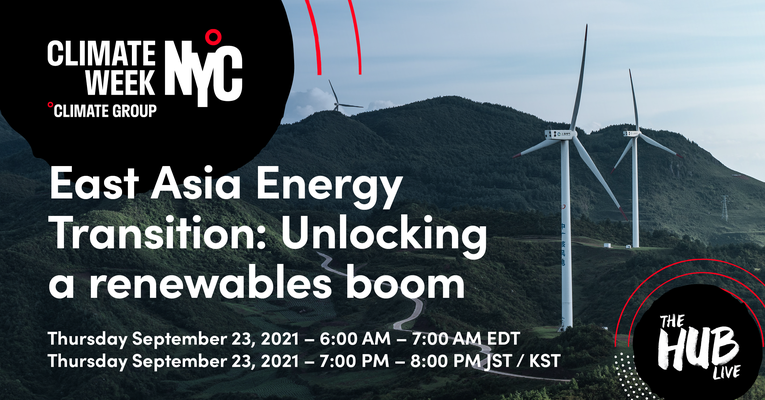East Asia Energy Transition: Unlocking a renewables boom
The Climate Group’s RE100 initiative has been hugely successful in encouraging businesses to commit fully to renewable electricity. The scheme has helped signatories take action and has persuaded governments to remove barriers.
Now, more businesses in the East Asia region need to join up, while governments need to support these efforts further by increasing their renewable goals and removing any remaining barriers to transitioning to green energy sources.
A shared vision
Speaking at Climate Week NYC’s event East Asia Transition: Unlocking a new renewables boom, Mr. Yang said: “All of us need to closely work together with the shared vision of carbon neutrality and make well rounded efforts. Chungnam will do its utmost to tackle climate change with a firm belief that one small step for man can go a long way for mankind.”
The event, hosted by Katherine Dixon, Chief Counsellor, Transitions & Partnerships, International Energy Agency, featured a panel of industry experts from across the region along with the UK government’s COP26 Regional Ambassador to Asia Pacific, Ken O’Flaherty.
The panel comprised Kahori Miyake, Chief Sustainability officer of AEON and Co-Chairwoman of Japan Climate Leaders’ Partnership; Leo Wirawan, Energy Strategy and Global Infrastructure for Google; Yang Seung-Ho, Assistant VP, Head of Energy Strategy Team, KEPCO; and Matthias Bausenwein, President of Ørsted Asia Pacific.
A road map towards net zero
Setting out the focus of the event, Katherine Dixon said: “Earlier this year, the IEA set out a road map towards a net zero energy system. It described an unprecedented transformation. In the near term, we need the immediate massive deployment of all available clean and efficient energy technologies. Renewables of course, have a massive role to play, with global generation from renewables needing to nearly triple by 2030 and grow eight-fold by 2050.”
With COP26 now underway, transitioning to renewable energy is firmly on the agenda. Speaking to Aleksandra Klassen, Senior Impact Manager for RE100 Climate Group, Mr. O’Flaherty outlined the challenge faced by governments in the Asia-Pacific region in transitioning to renewable energy sources, and how cooperation between all parties could help.
“We know that many governments worldwide, including in this region, need assistance in transitioning to renewable energy,” he said. “The COP26 energy transition council was set up to facilitate that kind of support. It’s bringing together governments, regulators and network operators with relevant international institutions who can give technical support and expertise. It also involves international development banks, like the ADB as well as business experts.
Making a concerted effort
Achieving the ambitious transition targets being talked about at COP26 will require a concerted effort from business, national governments and sub-national governments. “I always say businesses have a key role in driving climate action,” said O’Flaherty. “I think that’s particularly true in Asia. We’ve seen for decades strong growth in Asia and a lot of that has been based on very close partnerships between government and business. If businesses tell governments that it’s crucial for their future profits for them to have access to renewable energy, I think governments will listen.”
The importance of public policy
Google’s Leo Wirawan agreed: “There is a lot of scope for cooperation within utilities, renewable developers, corporates and regulators.”
Google has set itself the challenging target of reaching 24/7 carbon-free energy use by 2030. To reach this goal, Google will need to source multiple types of renewable energy, drive development of next generation technologies and work closely with partners to advocate for smart public policies. But business can’t achieve these results alone, he added: “Public policy is essential to accelerating decarbonisation.”
The role of sub-national governments
South Korea’s Chungnam province is the perfect example of how sub-national governments can play their part in achieving this. Mr. Yang pointed out that the province has taken the lead in this area.
Over the past few years, Chungnam has hosted the Phase-out and Proactive, Pre-emptive Responses to Climate Crisis, became the first local government in South Korea to join the Under 2 Coalition, and joined the Powering Past Coal Alliance. “Chungnam’s efforts have made the statement that a local government can lead proactive, pre-emptive climate action,” he said.
With more companies and governments joining such initiatives, East Asia will be well on its way to meeting its commitments in the fight against climate change.
Watch the full event on Facebook
